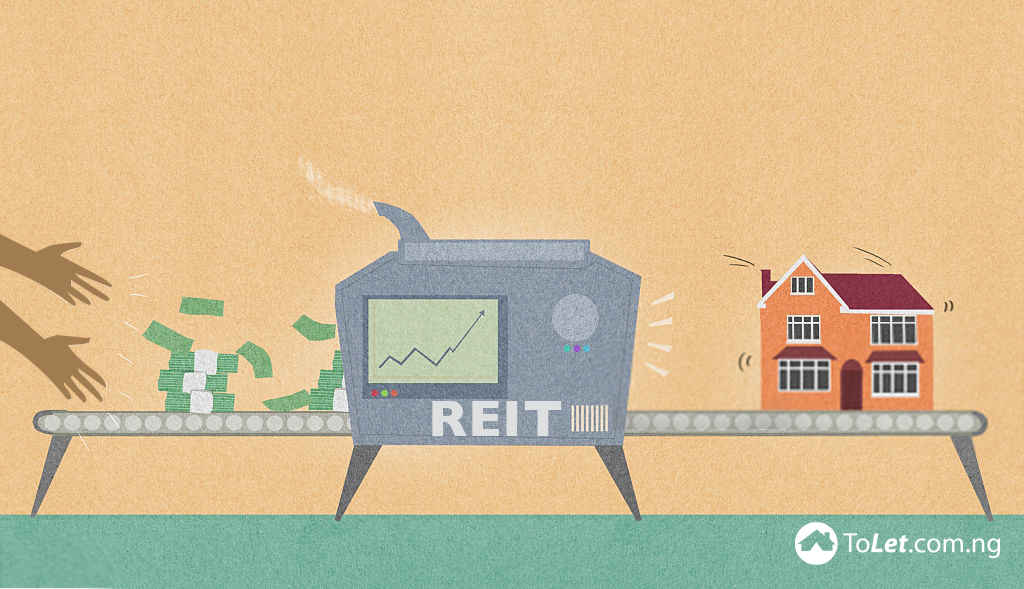How to Get a Property with a Real Estate Investment Trusts (REIT) in Nigeria

Most Nigerians do not know about the Real Estate Investment Trusts (REITs). Although, Several experts had predicted that the real estate sector is the next money-spinner for investors in the country. To the average Nigerian, this may be all talks and no actions. Many reasons, including wrong investment options, and lack of funds, according to experts in their presentations, may be obstacles to this realization. This position was aptly captured by Mr. Olumayowa Ogunwemimo In his presentation titled: “REIT as an alternative source of real estate financing in Nigeria,’’

The REITs alternative
Ogunwemimo regretted that Nigeria has not fully tapped into the availability of other sources of financing projects in the sector, which would serve as a big complement to the traditional sources of finance to the real estate industry. For instance, he explained that while Nigeria is yet to fully capitalise on the inherent benefits of Real Estate Investment Trusts (REITs), to significantly finance real estate developments, other countries have since keyed into the scheme. REITs are a form of collective investment scheme regulated by the Securities and Exchange Commission (SEC), which pools capital from investors and uses same in the acquisition of income generating real estate, mortgage loans, or a combination of both. The portfolio of underlying assets is placed under professional management to maximise returns to the investors, who are able to hold indirect interest in real estate on a flow-through basis, placing them in a position as if the property were held as a direct investment
Types of REITs
Ogunwemimo explained that there are three types of REITs; viz: Equity REITs, Mortgage REITs and Hybrid REITs. He explained that Equity REITs are real estate companies that acquire commercial properties – such as office buildings, shopping centers and apartment buildings – and lease the space in the structures to tenants, who pay rent. After paying the expenses associated with operating their properties, Equity REITs pay out yearly the bulk of the income they collect to their shareholders as dividends. Equity REITs also include capital appreciation from the sale of properties in the dividends they pay. In all cases, this significant dividend distribution is designed to approximate the investment return investors would receive if they owned properties directly.
ALSO READ: 3 Easy Steps to Buying Your Parents a Home
Mortgage REITs deal in investment and ownership of short or long-term property mortgages. It loans money for mortgages to owners of real estate, or purchase existing mortgages or mortgage-backed securities. Their income is derived from the interest they earn on the mortgage loans. Both are registered with the SEC, but non-listed REITs are sold directly to investors by brokerage firms and are not traded on any exchange. Equity and Mortgage REITs also can be privately held.
According to Ogunwemimo, Hybrid REITs is a combination of the investment strategies of equity REITs and mortgage REITs by way of investing in both properties and mortgages. Their income comes from rentals, capital appreciation, interest, and loan placement fees.
Benefits
REITs has been found to come with a lot of benefits. One of this is portfolio diversification, as real estate investment offers an alternative to equities and fixed income securities, especially for investors interested in diversification.
Liquidity is also another benefit accruable from REITs as it makes for relatively liquid assets (when compared to direct investment in real estate) that can be sold fairly quickly to raise cash or to take advantage of other investment opportunities.
CHECK: PROPERTIES FOR SALE IN LAGOS
Since a large percentage of property developers’assets are still tied up in real estate assets, REIT provides an opportunity for such companies to free up this cash and still hold an indirect interest in a portion of the assets.
Accessibility is also a key component of REITs as it allows investors with a small amount to diversify their holdings between various geographic areas and property specializations, among other benefits.
Challenges
Ogunwemimo noted that unlike most countries where REITs enjoy a tax-exempt status when it distributes at least 90 percent of its income to investors, in Nigeria, the tax laws are not explicit; hence, an unfavorable tax regime.
ALSO READ: 6 Important Questions to Ask Before Hiring a Real Estate Agent
Another challenge to this scheme is poor investors’ awareness, as investors in Nigeria have little or no knowledge of REITs.
Also, Return on investment in REITs is relatively low when compared to risk-free government securities, thus making investments in real estate assets unattractive to investors. Equally, the cost of transferring assets from the sponsor to the REIT has hitherto been onerous, constraining the ability of the REIT to generate competitive returns.
However, with the introduction of the Declaration of Trust Structure (DoT), there has been a significant reduction in the charges incurred by REITs when transferring the assets from the sponsor to the REIT.
Source: The Nation
Visit www.tolet.com.ng to buy, sell and rent properties in Lagos.










